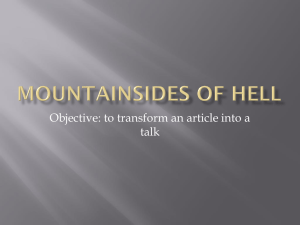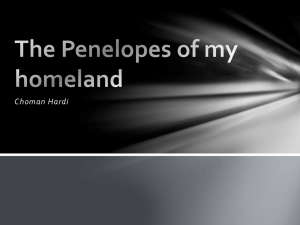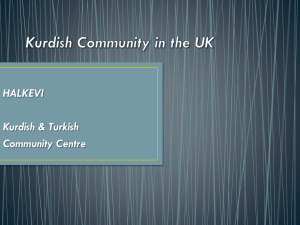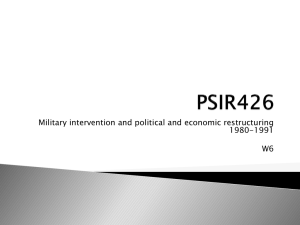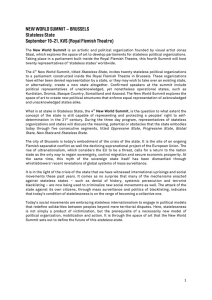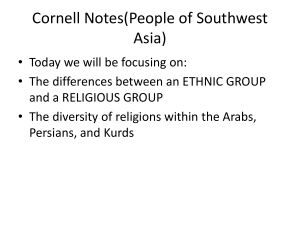Kurdish as a heritage language initiative
advertisement
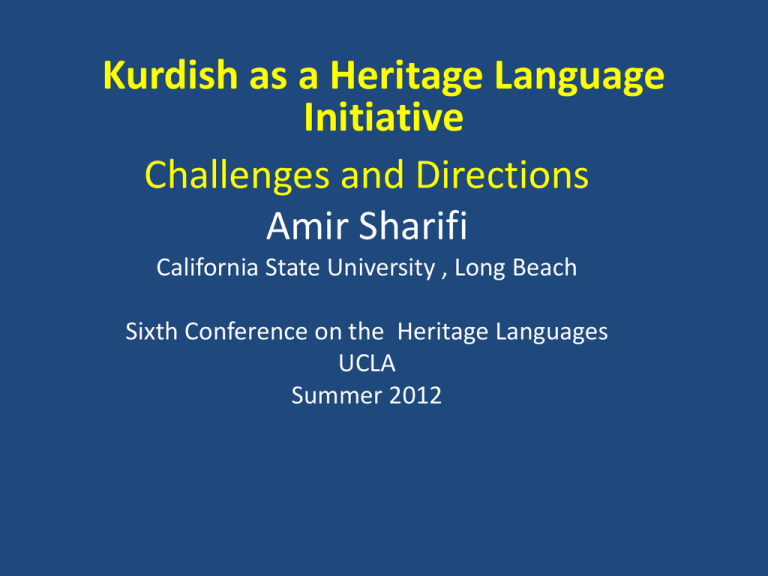
Kurdish as a Heritage Language Initiative Challenges and Directions Amir Sharifi California State University , Long Beach Sixth Conference on the Heritage Languages UCLA Summer 2012 Kurdish community in Southern California ( Two members of the Kurdish Youth Organization ABSTRACT • • • • • • • Kurdish is spoken by Kurds in Iran, Turkey, Iraq , Syria, Armenia , and diasporic communities of Kurds throughout the world. The language has been spoken even before recorded history for thousands of years . Because of linguistic discrimination, Kurdish has faced many prohibitions (Skutnabb-Kangas 2003) for almost a century. In Turkey, Iran, and Syria Kurdish medium schools are not allowed. To different degrees , Kurds in Iran, Iraq , and Syria have suffered what has been termed as “ linguicide ( Hassanpour 2000)”. Many Kurds have been assimilated into the dominant cultures. During the past one hundred years , Kurds have risen against language discrimination to defend their linguistic and cultural rights . Catastrophic events such as halabja and enfal massacres in Iraq under Saddam Hussien, linguistic denial and suppression of kurdish identity in Turkey, Iran, and Syria, denial of the right to education in Kurdish with the exception of Northern Iraq where Kurdish is the medium of education and minorities have their own schools , a great many Kurds have been decimated; many have been forced into mass migration, displacement, and assimilation. The first generation of Kurds in Southern California has not been able to avoid gradual language shift as the indirect outcome of such exclusionary language policies and monolingual ideologies . Because of the official status of Kurdish in Iraq and growing interest in Kurdish studies and linguistics , Kurdish may be able to find its rightful place among heritage languages in Southern California. The sizeable pockets of Kurdish diasporic communities in Southern California hope to receive a grant from the Kurdish Regional Government (KRG) to initiate Kurdish as a heritage language campaign and program with the support of Heritage Language Institute at the University of California, Los Focus of presentation • A brief overview of the linguistic profile of Kurdish heritage speakers • Challenges of recognition and new directions Kurdish Challenge and Directions • Kurds in California are heterogeneous as they come from different geographic areas, religious affiliations, cultural traditions, and language varieties; as a result, they are multilingual and multicultural • There are no studies of this community in terms of its sociolinguistic ecology. • As diasporic communities from different regions, Kurds continue to use their language as a unifying force and defining feature of their identity. • As literary Kurdish grows in significance and the language spreads through digital technologies, many Kurds in diaspora show a keen interest in learning and learning about the literate practices of their heritage language • However, the younger members are in the process of language shift. Kurdish Population Country Official LANGUAGE(s) Number of Kurdish speakers Iran Persian 6.8 million Turkey Turkish 15.4 million Iraq Arabic, Kurdish 4.3 Syria Arabic 1.3 million Armenia Armenian, Kurdish 40000 Kurdish diasporic communities Millions, no precise figure available Source: Izady (1992) Number of Speakers • • • • • • Major dialects: Kurmanji and Sorani Northern Kurmanji ( 80% of all speaker) Southern Kurmanji (20% ) Europe : Over a million U.S : Thousands Kurds in 2011 Irvine Global Festival Kurdish Population in Southern California • Precise figures not available but in thousands • Distribution of language varieties : • Los Angeles and San Diego: Over 80% Sorani Speakers • San Francisco : over 70% Kurmanji speakers Kurdish as a heritage language initiative Context • A relatively large number of heritage speakers interested in attending classes • They can also provide the required resources for research • The community is very vibrant and can provide those who learn the language as foreign language meaningful context for practice Background/ Community Efforts • The Kurdish language was offered by UCLA Department of Near Eastern Studies in 1986 through community funding but was discontinued after a year • In San Diego, a community based school established a weekend community school in EL Cajon with meager resources and a great deal of dedication ; however, ever since the teacher returned to his homeland, the school is not operating • In San Francisco there is a week end community school Background/ Kurdish in the U.S • Portland University, College of Liberal Arts and Sciences: World Languages and Literature • http://pdx.edu/wll/ • University of Maryland, Kurdish language assessment • Kurdish Studies and language classes at Middle Tennessee State University (MTSU) Background/ Kurdish in the U.S • University of Arizona:The Critical Languages Program (CLP), in cooperation with the National Association of Self-Instructional Language programs (NASILP), the U.S. Department of Education, the National Security Education Program (NSEP) and the University of Arizona College of Humanities • http://cls.arizona.edu/about.htm New opportunities • Growing significance of the language • Now recognized as the official language of Kurdish Regional Government (KRG) of Iraq • KRG has entered the realm of language education • Global business and political interest in the language and culture in KRG New opportunities • Greater interest in heritage languages as a whole • The U.S government’s interest in Kurdish language testing development • Growing interest in developing teaching and learning materials outside the mainland • Interest in Kurdish studies and linguistics as an under studied field METHODS • Collecting data on the sociolinguistic ecology of the community in Southern California • Survey and ethnographic methods (participantobservation, audio and video recordings, and informal interviews) • The surveys are being given to general members and heritage language learners through mail, email, and in person • The researcher also participates in the community’s cultural activities Kurdish heritage language Initiative Survey • Request for your cooperation: • I appreciate your help in conducting a survey on the views and perceptions of the Kurdish community in Southern California about the need for the recognition and establishment of Kurdish as a heritage and world language. Your views are crucial to understanding the needs and aspirations of the Kurdish diasporic community. The survey will only take about 5 minutes of your time. Your responses will be anonymous. By completing this survey, your name will be entered into a drawing for a gift card for $50. To do the survey, please follow the steps recommended. • Instructions: Please answer every question that follows, adding your additional comments wherever appropriate. The anonymity of all respondents will be ensured throughout the process. The community will be notified once the findings become available. Kurdish heritage language Initiative Survey excerpt • Part 1/ Demographic Information • • • • • • • • • • • • Gender (M/F) Age (years) Marital status( married, single. If you have children, how many and how old are they?) Occupation Length of residence in the U.S Country of origin Level of education First or primary language when growing up Frequency of visits to your “homeland”? Visit to Kurdish Regional government ( how many times if you have visited) Kurdish heritage language Initiative Survey excerpt Part 2/Language Contexts • • 11.What languages are spoken at home? • Kurdish English Persian Turkish Arabic Other (please explain) • 12.What language do you use to speak to your children or parents? • Kurdish/English/ Persian always Kurdish more English than Kurdish equal amounts of Kurdish and English always English Kurdish heritage language Initiative Survey excerpt • Part 3 Attitudes toward Kurdish language classes • 28.It is important to offer Kurdish classes in Southern California for Kurds? • Strongly agree Agree Disagree Strongly Disagree Don't know • 29.If Kurdish classes become available, I will be taking them. • Strongly agree Agree Disagree Strongly Disagree Don't know Challenges of introducing Kurdish as a heritage language • Political divisions and ideological opposition • Institutional impediments • Pedagogical: Paucity of teaching and learning materials Organizing and Advocacy • Organize and advocate community involvement in the campaign for recognition • Obtain the support of the National Heritage Language Resource Center, the Center for World Languages and Heritage Languages, Department of Near Eastern Studies • Urge KRG to initially fund the teaching of Kurdish as a heritage language Proposal • University of California, Los Angeles can become a center for Kurdish language and studies in the West Coast given the sizeable pockets of Kurdish heritage speakers • UCLA is uniquely positioned because of the Department of Near Eastern Studies and the Center for Heritage and World Languages The Community Based Initiative Campaign to urge KRG to offer grants The Foreign Language Teaching Profession Advocate and organize community To help Kurdish youth to maintain their language and culture To urge the community members to participate in the advocacy efforts Favorable Forces at Work U.S Government Interest Emerging interest In research on Kurdish Kurdish as a Heritage language Community Interests Political and Economic Developments In KRG Trilateral Collaboration for the Establishment of Kurdish as a heritage language Kurdish Regional Government Community UCLA Institutional support CONCLUSIONS • The preliminary analysis will explore the role and identity of the Kurdish diasopric community in Southern California in connection with a community based effort to introduce Kurdish as a heritage language because the first generation of Kurds in California is in danger of language loss • Preliminary observations reveal that for the Kurdish youth , Kurdish marks their ethnic identity and associates them with the community here and the larger community at home • The initiative by raising awareness of such a need will mobilize community support that would encourage and urge Kurdish Regional Government and heritage language centers to support the establishment of programs to socialize Kurdish heritage speakers into their language and culture CONCLUSIONS • Kurdish continues to be used widely in mostly sociocultual context and relations in Southern California among older and middle aged parents • The language is used for interpersonal communication and as a marker of Kurdish distinct identity • Gradually the Kurdish youth is losing its first language , a langauge that for their parents index cultural and ethnic belongingness. Most parents have not received an education in Kurdish either, thus complicating literacy practices • The current survey will study the status and direction of Kurdish as a whole, particularly among first generation of Kurds who continue to value their cultural and linguistic heritage References • • • Hassanpour, A. (2000). The Politics of A-Political Linguistics: Linguists and Linguicide. In R. Phillipson (Ed.), Rights to Language: Equity, Power, and Education : Celebrating the 60th the 60th Birthday of Tove Skutnabb-Kangas.(pp.28-33). New Jersey & London: Lawrence Erlbaum Associates Izady, M. (1992).The Kurds: A Concise Handbook. Taylor & Francis Publishers. Skutnabb-Kangas, T. (2003). Linguistic Diversity and Biodiversity: The threat from Killer Languages. In C. Mair (Ed.), The Politics of English as a World Language: New Horizons in Postcolonial ... (pp.31-53). Editions Rodopi.Amsterdam B.V.,New York.
